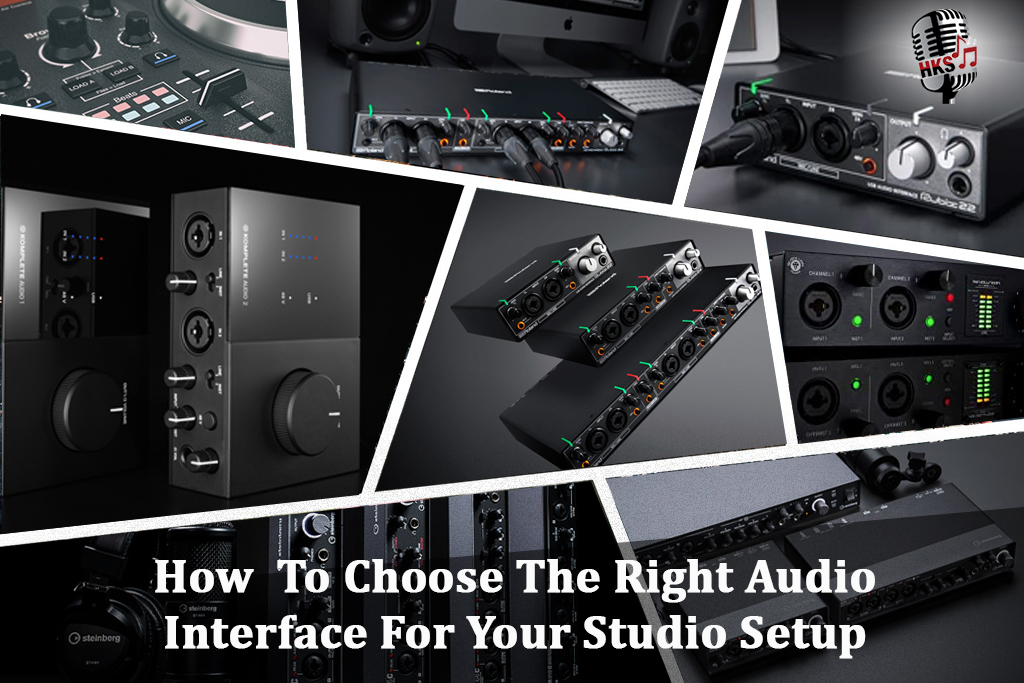Republic Day Sale | 35% Off | USE COUPON CODE - FREEDOM35

As a music producer, recording artist, or audiophile, having the proper audio interface is crucial for a seamless studio setup. An audio interface bridges your computer and your instruments or microphones, allowing you to record and produce high-quality sound. However, with so many options available, choosing the right one for your needs can take time and effort. This blog will guide you through the essential factors to consider when selecting the perfect audio interface for your studio setup.
Consider what kind of recording you plan to do. For example, will you record just one instrument at a time or a full band? Do you need to record vocals or acoustic instruments? These factors will help you determine how many inputs and outputs you need.
Determine Your Input/Output Needs
Before you start browsing for an audio interface, it's essential to consider the number of inputs and outputs you require. Think about the instruments, microphones, and other devices connecting to the interface. A smaller interface with two inputs might suffice if you're a solo artist. However, you'll need more input if you plan to record multiple instruments simultaneously.
Consider Your Budget
Audio interfaces come in a wide range of prices, so it's crucial to establish a budget before you start shopping. Remember that more expensive interfaces usually offer better audio quality and additional features. However, many affordable options still need to deliver professional results. Balance your needs and budget to make an informed decision.
-
The Behringer U-Phoria UM2 is a compact, two-channel audio interface perfect for beginners or those who are tight on budget.
-
The Universal Audio Apollo x8p is a top-of-the-line audio interface that's perfect for professional recording studios which is a high-priced audio interface.
Quality Converters
The audio quality of your recordings is directly impacted by the audio interface you choose. Look for an interface with high-quality preamps, converters, and a wide dynamic range. A higher bit depth and sample rate will also improve audio quality, allowing for more precise recordings and mixing. Look for an interface with a high-quality DAC, Low-noise floor, and low jitter rate.
Also, look for an interface with high-quality converters to help ensure your recordings sound great. Some examples of audio interfaces with high-quality converters include The Universal Audio Apollo X series, the RME Fireface UFX II, and the Apogee Ensemble Thunderbolt.
Check Compatibility
Ensure your chosen audio interface is compatible with your computer's operating system and Digital Audio Workstation (DAW) software. For example, some interfaces are designed specifically for Mac or Windows, while others offer universal compatibility. You can connect your speakers or headphones to your audio interface using the appropriate cable to check compatibility. Next, open your karaoke setup and select your audio interface as the input and output. For example, you can play Hindi karaoke songs and sing into the microphone. Finally, adjust the levels on your audio interface to ensure the sound is balanced and clear.
Look For Additional Features
If you plan to use other equipment with the audio interface, such as external processors or MIDI controllers, make sure they are also compatible with the interface. Check the interface's user manual or product page for information on any additional requirements or compatibility issues.
Researching and checking the compatibility of an audio interface with your studio setup is essential before making a purchase. It will ensure you can use the interface fully and avoid compatibility issues.
Consider Connectivity
Consider what kind of connectivity options you need. Do you need USB, FireWire, Thunderbolt, or something else? Make sure the interface you choose has the appropriate connections for your setup.
Read Reviews
Read reviews from other users and professionals to get an idea of the reliability and performance of the audio interfaces you're considering.
Consider Future Needs
Consider your future needs as well. For example, if you plan to expand your studio setup in the future, make sure the audio interface you choose can accommodate those future needs.
Conclusion
Choosing the right audio interface for your studio setup is a crucial decision that can significantly impact the quality of your recordings. By considering your input/output needs, audio quality, compatibility, budget, and additional features, you can select the perfect interface to help you create professional-sounding music. So, do your research, assess your needs, and invest in an audio interface that will elevate your studio experience. Read reviews and listen to audio samples to get a sense of the sound character and overall performance of the interface you are considering.
Investing in a quality audio interface can make a significant difference in the sound of your recordings and ultimately help you achieve your creative goals as a music producer or audio engineer.
By considering these factors discussed in the above blog, you should be able to choose an audio interface that fits your studio setup and recording needs.








Vijay Mistry
2 years ago
The article provided great insights on choosing the right audio interface for my studio setup. It emphasized the importance of considering factors like connectivity options, audio quality, and compatibility with my recording software. The tips and recommendations given were practical and easy to understand. I now feel more confident in making an informed decision for my studio. Thanks for the helpful advice!
Shelu Mishra
2 years ago
This blog serves as an excellent guide for individuals seeking to select the right audio interface for their studio setup. Its clear and concise explanation of the essential considerations and tips will undoubtedly assist readers in making an informed decision tailored to their specific needs. Well done!
Yadit Kumar
2 years ago
Good job! Your blog actually helps me to get a better understanding of studio setup.
Radha Sharma
2 years ago
Great article! I found the tips on determining input/output needs and considering future expansion particularly helpful. It's crucial to choose the right audio interface for a seamless studio setup, and this blog provided valuable insights to make an informed decision. Thanks for sharing!"